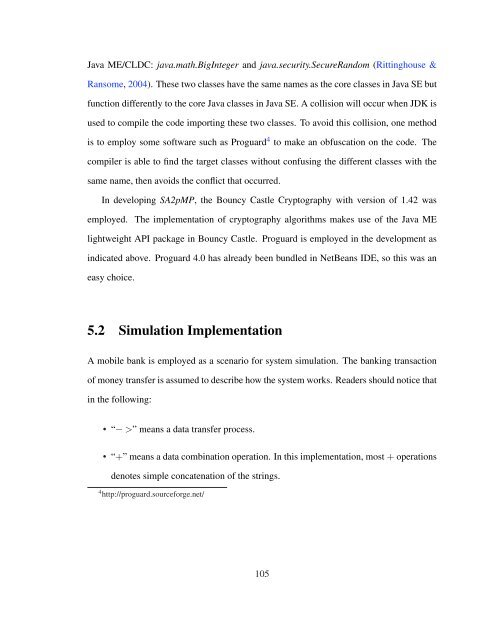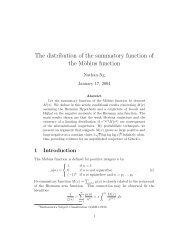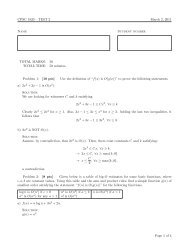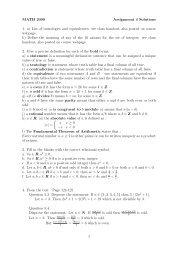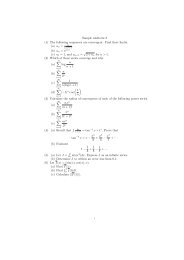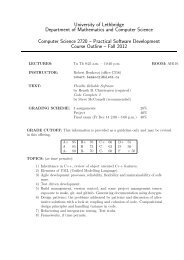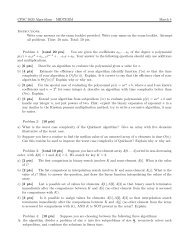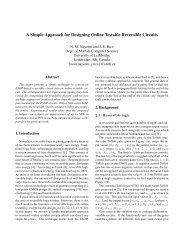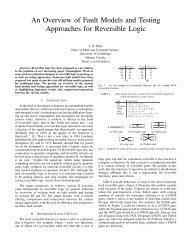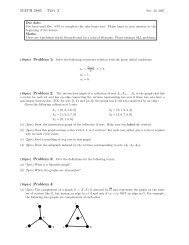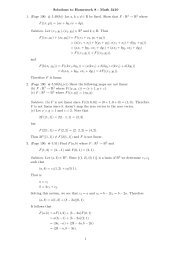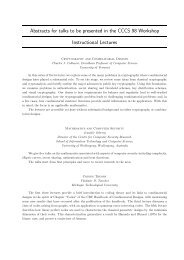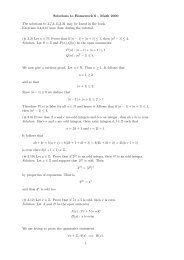- Page 1 and 2:
A NEW ARCHITECTURE FOR SECURE TWO-P
- Page 3 and 4:
I wish to dedicate this thesis to m
- Page 5 and 6:
List of Appended Papers Parts of th
- Page 7 and 8:
Contents Title Page Approval/Signat
- Page 9 and 10:
4.2.2 Server Architecture .........
- Page 11 and 12:
List of Figures 2.1 The major mobil
- Page 13 and 14:
in becoming a successful mobile ser
- Page 15 and 16:
1.3 Problem Statement The objective
- Page 17 and 18:
limited environment of mobile devic
- Page 19 and 20:
the Record Management System (RMS).
- Page 21 and 22:
are presented. Chapter 7 This chapt
- Page 23 and 24:
can provide more convenience, mobil
- Page 25 and 26:
GSM is limited in its low data tran
- Page 27 and 28:
Code Division Multiple Access (W-CD
- Page 29 and 30:
as it does not provide a secured en
- Page 31 and 32:
2.3.1 Mobile Payment Overview A mob
- Page 33 and 34:
Figure 2.1: The major mobile paymen
- Page 35 and 36:
2.4.1 Mobile Devices’ Overview A
- Page 37 and 38:
ian OS are developed using standard
- Page 39 and 40:
Linux Linux is a Unix-like computer
- Page 41 and 42:
included in the iPhone SDK agreemen
- Page 43 and 44:
2. a profile which is a set of APIs
- Page 45 and 46:
MIDP occupies the layer above CLDC,
- Page 47 and 48:
2.6.1 Authentication: Definition In
- Page 49 and 50:
2.6.3 Multi-factor Authentication F
- Page 51 and 52:
A cryptography algorithm is a mathe
- Page 53 and 54:
Advanced Encryption Standard The Ad
- Page 55 and 56:
The AES algorithm is required to be
- Page 57 and 58:
on a paper document (Stallings, 200
- Page 59 and 60:
Table 2.2: Applications for DSA, RS
- Page 61 and 62:
suitable for securing mobile bankin
- Page 63 and 64:
2.7.4 A Comparison of Symmetric-key
- Page 65 and 66: chitecture to provide comprehensive
- Page 67 and 68: mum base memory of 192 KB and a 16/
- Page 69 and 70: produces software components that c
- Page 71 and 72: the financial sector and the client
- Page 73 and 74: 3.1.4 Application Layer The current
- Page 75 and 76: The information in the table is exp
- Page 77 and 78: Figure 3.5: An Onion Layer Framewor
- Page 79 and 80: Illustrated in Figure 3.6, the X-ax
- Page 81 and 82: As illustrated in Figure 3.6, the r
- Page 83 and 84: mobile devices, the employment of E
- Page 85 and 86: • Something you are or do: This m
- Page 87 and 88: Chapter 4 System Design This chapte
- Page 89 and 90: • DVeri f y: Denotes the verifica
- Page 91 and 92: the application layer, it focuses o
- Page 93 and 94: crypter were the same sender (Davis
- Page 95 and 96: Encryption Layer SA2pMP utilizes a
- Page 97 and 98: control. 4.1.5 Distributed Transact
- Page 99 and 100: log server is maintained by the mob
- Page 101 and 102: nature does not share anything secr
- Page 103 and 104: is transferred to the authenticatio
- Page 105 and 106: and government systems (Lam et al.,
- Page 107 and 108: Figure 4.7: The mobile banking modu
- Page 109 and 110: key and a public key. It then distr
- Page 111 and 112: the encryption and decryption publi
- Page 113 and 114: Chapter 5 System Simulation In this
- Page 115: The simulation system was developed
- Page 119 and 120: described as follows: 1. To initiat
- Page 121 and 122: which is used to compare with the d
- Page 123 and 124: Figure 5.2: The variables’ transf
- Page 125 and 126: ackground on the cryptography algor
- Page 127 and 128: The Criteria of Nielsen (1995) Base
- Page 129 and 130: focused on the delay caused by prot
- Page 131 and 132: Figure 5.4: The time delay on Sony
- Page 133 and 134: caused by verifying operation on th
- Page 135 and 136: although some visual or multi-modal
- Page 137 and 138: Chapter 6 System Comparison In this
- Page 139 and 140: uns at over 165 Kbits/s on the Java
- Page 141 and 142: and the end-to-end security mechani
- Page 143 and 144: 6.1.4 Secure Electronic Transaction
- Page 145 and 146: end-to-end client authentication, a
- Page 147 and 148: • In comparing the employment of
- Page 149 and 150: • A mobile payment transaction ha
- Page 151 and 152: Although it is impossible to make u
- Page 153 and 154: Chapter 7 Conclusions and Future Wo
- Page 155 and 156: Additionally, the security API pack
- Page 157 and 158: this thesis. However, the transacti
- Page 159 and 160: K E Denotes the secret key for the
- Page 161 and 162: [RK S ,PK S ] Denotes a digital sig
- Page 163 and 164: FIPS FORTRAN Federal Information Pr
- Page 165 and 166: MFA MIDlet MIDP Mobile Device Multi
- Page 167 and 168:
SFA SHA SHA-1 SM Smartphone Single-
- Page 169 and 170:
References ABI Research. (2007). 20
- Page 171 and 172:
Diffie, W., & Hellman, M. (1976). N
- Page 173 and 174:
Java Community Process. (2002). Mob
- Page 175 and 176:
Microsoft Corporation. (2009). Wind
- Page 177 and 178:
Roto, V., & Oulasvirta, A. (2005).
- Page 179 and 180:
Tipton, H. F., & Krause, M. (2007).
- Page 181 and 182:
Appendix Part of Client Simulation
- Page 183 and 184:
24 public class MoBankMIDlet extend
- Page 185 and 186:
75 return alert_notes ; 76 } 77 78
- Page 187 and 188:
129 / ** 130 * The MoBankMIDlet c o
- Page 189 and 190:
167 / / w r i t e post −a c t i o
- Page 191 and 192:
208 / ///GEN−BEGIN:∣66− g e t
- Page 193 and 194:
251 textAccound = new TextField ( "
- Page 195 and 196:
285 / / w r i t e pre−a c t i o n
- Page 197 and 198:
324 / / w r i t e pre−a c t i o n
- Page 199 and 200:
367 / / //GEN−END:∣74− g e t
- Page 201 and 202:
409 groupPayto = new ChoiceGroup (
- Page 203 and 204:
America / Edmonton " ) );/ / GEN−
- Page 205 and 206:
487 * R e t u r n s an i n i t i l
- Page 207 and 208:
528 return sucForm ; 529 } 530 / /
- Page 209 and 210:
569 loginScreen = new LoginScreen (
- Page 211 and 212:
614 return image1 ; 615 } 616 / / /
- Page 213 and 214:
656 public Image getImage2 ( ) { 65
- Page 215 and 216:
699 / / w r i t e pre−a c t i o n
- Page 217 and 218:
740 public void execute ( ) throws
- Page 219 and 220:
787 / / //GEN−END:∣156− gette
- Page 221 and 222:
825 * @return t h e i n i t i a l i
- Page 223 and 224:
868 * R e t u r n s an i n i t i l
- Page 225 and 226:
913 * @return t h e i n i t i a l i
- Page 227 and 228:
962 963 / ** 964 * C a l l e d t o
- Page 229 and 230:
24 25 / ** 26 * HTTP CONNECTION TO
- Page 231 and 232:
72 } catch ( ClassCastException e )
- Page 233 and 234:
13 import org . bouncycastle . asn1
- Page 235 and 236:
63 64 65 } 66 67 68 69 / ** 70 * 71
- Page 237 and 238:
AES256Crypto package org.yunpu.cryp
- Page 239 and 240:
40 private SecureRandom random = ne


